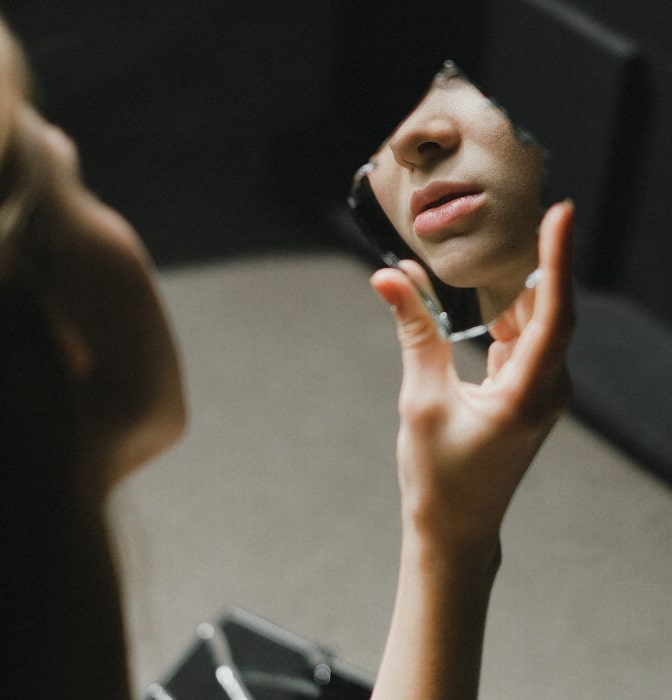Body Dysmorphia: Talking About It

Body Dysmorphia is a mental illness that can affect anyone at any time in their life. Though, teenagers and young adults are particularly susceptible to the thoughts and feelings associated with body dysmorphia. At Eva Carlston Academy, we try our best to provide support to the students that may be struggling with this mental illness and creating an overall supportive environment can help with this. Additionally, a specific type of therapy, Cognitive Behavioral Therapy or CBT can be particularly effective in assisting someone in overcoming their obsessive thoughts. Body Dysmorphia can have a negative impact on a person’s day to day life and understanding its ins and outs can allow us to give that person words of encouragement and a safe space for them to face these challenges.
What Is Body Dysmorphia?
Typically, if someone is suffering with this mental illness they may be overly self conscious about how their body looks, or have a distorted view on a particular area of themselves. BDD makes people feel anxious and in a constant state of worry about their appearance. Oftentimes people who are uneducated about this mental illness believe Body Dysmorphia to be someone who is self obsessed or conceited, which couldn’t be further from the truth. If an individual struggles with the thoughts associated with BDD, they can’t control what enters their own mind about their body and may feel shame or intense focus over their perceived flaws.
Specifically, people who have Body Dysmorphic Disorder may:
- Worry a lot about a specific area of their body (particularly their face)
- Spend a lot of time comparing their looks with other people’s
- Look at themselves in mirrors a lot or avoid mirrors altogether
- Go to a lot of effort to conceal flaws – for example, by spending a long time combing their hair, applying make-up or choosing clothes
- Pick at their skin to make it “smooth”
- Being extremely preoccupied with a perceived flaw in appearance that to others can’t be seen or appears minor
- Frequently seeking reassurance about their appearance from others
- Having perfectionist tendencies
Having this mental illness, like any, can be mentally and emotionally exhausting.
Body Dysmorphia and Eating Disorders
How does Body Dysmorphia develop? Though it’s commonly associated with eating disorders, it can happen to anyone regardless of having an eating disorder or not. These two mental illnesses are different from one another in a couple of different aspects. One of which being, those with eating disorders are focused on their weight (whether it be losing or gaining weight) while those suffering from BDD are focused on one specific part of their body. On that note, it is completely possible for someone to be diagnosed with both an eating disorder and Body Dysmorphic Disorder.
Body Dysmorhpia can develop in a variety of ways, all of which depending on the individual. It could be associated with trauma, bullying, another mental illness tying into it (such as anxiety or OCD), low self esteem and much more. There is no “one size fits all” when it comes to diagnosing any mental illness, and this includes Body Dysmorphia.
Providing Support
Watching a loved one go through the trials and tribulations that come with Body Dysmorphia can be hard to witness. Arguably, it’s even harder not knowing how to provide support to the individual. You want to show them love and kindness but don’t want to overstep boundaries, so, how do you do it? One of the best ways you can support someone with BDD is to provide a safe space for them to open up if they choose to. Never pressure someone into telling you what may be going through their mind and always approach what they share with you with empathy.
Giving your loved one an environment where they feel safe can mean all the difference to them. Additionally, depending on the level of relationship you have with the individual you could gently suggest therapy or see if they’re up for it. If they are, offer to drive them or sit in the lobby during their session. If therapy is too expensive or they aren’t ready for that step, be sure not to pressure them and reassure any negative thoughts they may be experiencing.
At Eva Carlston Academy, we provide this safe space for students to express themselves and administer CBT for those who are ready for it and if it’s deemed necessary. Welcoming these students with open arms and implementing communication skills with both their treatment team, themselves, and their parents has shown great success. This gives the student the support they need during this vulnerable time in their life and ultimately shows them they aren’t alone (because they aren’t!). Showing kindness and empathy towards a loved one during a hard time is never a bad idea and can help them through their tough thoughts!
Call: 801-449-0089
Address: 4943 S Wasatch Boulevard, Salt Lake City, Utah 84124
